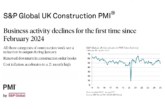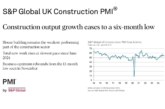
PBM’s Editor Paul Davies used his Viewpoint column in the magazine’s May edition to discuss the changing nature of the General Election campaign trail.
Writing about an event as significant as the General Election is always beset with problems in a monthly magazine. Asides from the obvious point about the need for impartiality, the time lag between printing and delivery means we could have missed a game-changing major scandal, error of judgement or ill-considered comment along the lines of 2010’s “bigoted woman” gaffe from Gordon Brown.
Indeed, it’s especially difficult speculating on a race that’s far too close to call (at the time of writing…), but there are a few things worth pausing to reflect upon.
Firstly, this has been a particularly absorbing contest in terms of its overall ‘profile’. The associated discussions which surrounded all aspects of the televised debates in addition to the greater attention — deserved or otherwise — received by the minor parties have perhaps stoked the interest, but this year’s General Election is being played out like never before through the internet in general and social media in particular.
Twitter traffic was huge, for example, following the TV debates and has been used as a bona fide analytical tool. Additionally, a fascinating online survey at www.voteforpolicies.org.uk highlights and compares the political pledges and commitments presented by the parties ‘anonymously’, allowing participants to make an informed yet unbiased choice. Around 500,000 individuals have taken part and whilst its demographic appeal may be a little skewed, that’s almost the point — helping to facilitate engagement with those who may previously have felt disconnected.
Leaving to one side the ‘presidential’ nature of the contest and any considerations about electoral reform, an increase in available information, genuine debate and discussion are forming the nature of this year’s campaign have the capacity to place far greater scrutiny on the candidates and their policies.
Both the traditional media and, especially, the politicians themselves need to take this step-change into greater consideration, as we currently still have to endure their clichéd mannerisms and games of soundbite bingo as target phrases like “difficult decisions”, “cost of living crisis” or “hard-working families” are constantly repeated in the belief that it will make the cut for the evening news.
“An increase in available information, genuine debate and discussion are forming the nature of this year’s campaign and have the capacity to place far greater scrutiny on the candidates and their policies.”
The other, and perhaps more specific, point of note is to consider just how high up the agenda construction and housebuilding have moved. Politicians of all hues have donned a hard hat in recent weeks to be pictured out on site, whilst industry-related issues have received prominence in all the party manifestos. The sector, I would argue, has shaped debate almost as much as the usual political footballs of the NHS and education.
It is easy to be cynical at this stage — we’ve been here many times before, of course — but it finally seems as though the penny has dropped. Politicians now genuinely appear to see that construction can clearly and demonstrably deliver huge economic and social benefits from job creation and apprenticeship training to supporting British manufacturing and addressing the housing shortage. And also, that it could be a vote winner.
As ever, promises are merely the beginning. Irrespective of how the next government is formed, it is delivery that counts and our elected representatives have much work to do. How will they fare? Maybe, by the time the next election comes around, we’ll have to let them know by Tweeting our vote!









